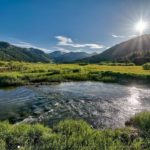Is Vail Resorts Killing Whistler’s Spirit? Can Alterra be far behind?
When Vail bought Canada’s famed Whistler Blackcomb ski mountain, locals were nervous. Now, after a record season of visitors, they’re enraged.
The takeover of Canada’s most iconic ski resort by an American corporation was never going to go smoothly. But Vail Resorts Inc.’s $1 billion acquisition of Whistler Blackcomb has Canadians seething.
The new owner’s offenses include the adoption of an on-mountain app that features Fahrenheit and inches, rather than Celsius and centimeters, and a season-pass pricing system that benefits globetrotting jet-setters at the expense of locals. Then there’s general discontent over the assimilation of a quirky, homegrown success story by an American corporate behemoth.
“They’re trying to cater to a wealthy, sheltered audience—I don’t know if that crowd really wants what we have,” says Cathy Zeglinski, a competitive athlete and family doctor who closed her Whistler practice last September, forced out by rising living costs and staff shortages in the town. “What we have is snow, extreme terrain,” she explains. “It’s blustery, it’s very hard to see. That’s why people come to Whistler—it’s very extreme.”

This is the first season that Whistler Blackcomb was included in Vail’s $879 Epic Pass (now $899 for the 2018-2019 season), a program that gives holders unlimited access to the company’s 14 resorts in North America and Australia. The impact has been immediate. Other sites on the pass include Beaver Creek and Vail in Colorado and Park City in Utah, where snowfall was at the lowest levels recorded in 30 years.

That helped push a chunk of Vail’s estimated 750,000 Epic Pass holders to look farther north this past season. More than 8 percent of holders visited Whistler Blackcomb, helping make it the most-visited mountain resort in North America, according to a March 13 Vail investor presentation.
Visitor numbers at Whistler set a record for the third straight year, thanks to visitors from the U.S., Mexico, Australia, and the U.K., Vail Resorts Chief Executive Officer Robert Katz said in a March 8 investor call. “That has been a pretty strong example, I think, of the power of the Epic Pass.”
Alienating the Locals
Canadians aren’t as impressed. Whistler Blackcomb’s tickets are now priced with a base rate in U.S. dollars—unfortunate for Canadians who hold the second-worst-performing major currency this year. The exchange rate for the two currencies is published above ticket prices, which fluctuate daily.

Meanwhile, Vail canceled Whistler’s popular one- and three-day prepaid lift tickets, which were discounted exclusively for Canadians and Washington state residents. The move underscores a shift away from local, casual skiers to focus on so-called destination visitors, a category that spends three times more than its regional counterparts at Whistler annually.
“It irks you,” says Roger Schmidt, an engineer based in Ottawa who’s been skiing at Whistler since the 1970s. “I’m the victim of the exchange rate in my own country. Not everybody has the time or the resources to go away for a 10-day ski vacation every season. It’s like the message is, if you’re local, you can ski at the smaller hills.”
Vail also is facing an effort by some employees to unionize, a challenge that originated in the ski school, whose top instructors get paid roughly C$25 ($20) an hour for teaching five-hour private classes that can earn the company up to C$860 ($676) a day. Whistler Blackcomb was primarily responsible for a $2 million jump in Vail’s ski school revenue for the three months ended January, according to the company’s latest quarterly results.
Meanwhile, circulating within the community is the hashtag #FailVail and ominous-sounding epithets like VailBorg or simply, the Mountain.
“We knew there would be challenges as we integrated two large companies,” Vail said in an emailed response to questions. “We have worked and continue to work together toward building upon Whistler Blackcomb’s continued success.”
Canadian Lore
The majestic twin peaks of Whistler and Blackcomb are seamlessly connected by the world’s highest gondola and have consistently been rated the continent’s No. 1 ski resort. Locally, they occupy a unique place in Canadian ski lore.
Whistler Blackcomb’s roots trace back to a group of gutsy Vancouver entrepreneurs in the 1960s who foresaw Olympic potential in a region with no road access, electricity, or running water. The current mayor was a squatter in the early 1970s, posing nude with skis alongside fellow occupiers facing eviction.

In the 1980s, when snowboarding was still banned at most North American mountains, Blackcomb welcomed the sport. Prime Minister Justin Trudeau, who was a snowboard instructor there, calls it his favorite ski resort.
While the purpose-built faux alpine village—a creation of the same landscape architect who designed Vail— may look like an outlet mall, it’s attracted an eclectic, polyglot mix of ski bums, free spirits, and well-heeled thrill-seekers united by a love of the resort’s singular terrain. The twin peaks’ massive 8,171 skiable acres offers something for everyone, but it’s the more than 2,200 acres of leg-burning black and double-black terrain that sets it apart. It’s enough to comprise a large ski resort on its own, and it offers some of the steepest, toughest runs on the continent.
More recently, an influx of wealthy transients has caused property prices to more than double in the past five years, according to the Real Estate Board of Greater Vancouver. Luxury boutiques have replaced local businesses, and workers desperate for housing have to rent shared rooms for hundreds of dollars a month. The problems started long before the acquisition, but locals fear it’s set to get worse. Residents of Park City, which was also purchased by Vail Resorts, have had similar concerns; brokers call it the “Vail Effect.”
Vail responded in an email, saying the company houses 31 percent of its work force at Whistler Blackcomb. Pete Sonntag, the resort’s chief operating officer, said in an interview in August 2017 that Vail may consider funding new construction to expand affordable housing.
Tourism Whistler’s CEO, Barrett Fisher, has said the town’s focus should be to attract the “right guests” appreciative of its mountain culture. “Business is booming, but so too is the level of local angst surrounding this growth,” she wrote in an open letter, acknowledging transportation, housing, and staffing pressures that back-to-back years of record visits have caused.
Vail at Work
Katz, Vail’s CEO and a former private equity investor, has defied a broader industry decline to build North America’s largest ski resort owner and operator. He’s done that by acquiring rival mountains and then luring snow hounds to the slopes by offering unlimited access to a smorgasbord of resorts. The more often people visit, the thinking goes, the more they’ll spend.
When Katz first introduced the Epic Pass encompassing five resorts a decade ago, he slashed the price of access to less than half the price of a season pass at most rival resorts. At the time, the move was seen as crazy. But the Epic Pass upended the industry, making snow sports more accessible and also driving a consolidation that’s put 39 resorts in the hands of just three corporations—Vail being the largest.
Vail is pouring money into Whistler Blackcomb to boost capacity, announcing a C$66 million investment—the largest single-year amount in the resort’s history—to fund a new gondola and upgrade lifts. It’s also declared a focus on high spenders. In its investor presentation last month, it cited efforts to target high-net-worth customers with personalized “luxury-focused content based on income.”
More upscale visitors will come who are “probably not coming to experience the terrain challenges of the mountains,” says G.D. Maxwell, a semi-retired columnist for local Pique NewsMagazine who’s lived in Whistler since 1992. “They like easy cruising, good food, and expensive shops.” In other words, the Canadian resort will increasingly come to resemble its Colorado parent. “Vail bought the No. 1 resort in North America and is now going to teach it how to be the No. 3,” Maxwell says.

